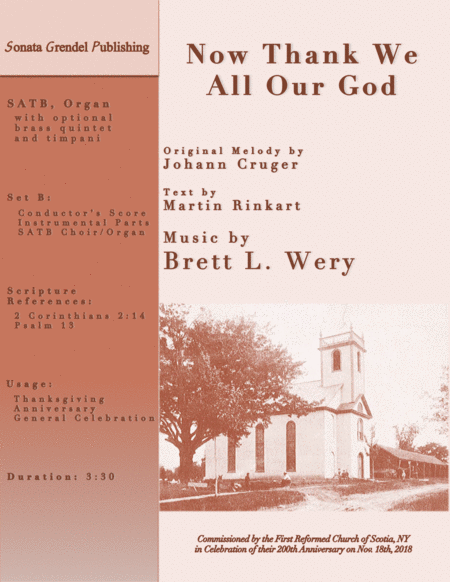Choral Choir (SATB) - Level 3 - Digital Download SKU: A0.837496 Composed by Martin Rinkart. Arranged by Brett L. Wery. Holiday,Praise & Worship,Sacred. Octavo. 44 pages. Sonata Grendel Publishing #5753937. Published by Sonata Grendel Publishing (A0.837496). SET B Conductor’s Score,Trumpet 1, Trumpet 2, Horn in F, Trombone, Tuba, Timpani, SATB Choir/Organ Now Thank We All Our God was originally written ca. 1636 by Protestant minister, Martin Rinkart. The melody is attributed to Lutheran Hymnist, Johann Crüger and was used in three J.S. Bach chorales but the most common version we hear today was harmonized by Felix Mendelssohn in 1840. Martin Rinkart was a deacon in Eisleben Germany where he served during the Thirty Years’ War. The city of Eisleben and Rinkart’s own home became a sanctuary for political refugees during the war. The resulting overcrowding in the walled city resulted in a horrible plague which hit its peak in 1637. Rinkart was the only surviving pastor in the city and before the plague was over he would preside over 4000 funerals include that of his own wife. Despite this, it was during this time that he wrote Now thank we all our God. This new setting of Now Thank We All Our God draws on Rinkart’s fierce spirit of optimism and faith in a time of desolation and despair. To paint the picture of the circumstances in which Rinkart wrote the hymn, this setting opens with the text from Psalm 13: How long, Lord? Will you forget me forever?The setting turns quickly, in an act of disruptive optimism and faith, to a lopsided dance of joy. In the end, the setting returns to the opening question of Psalm 13, How long? only to be answered by Rinkart’s declaration, Gifts of love today!
